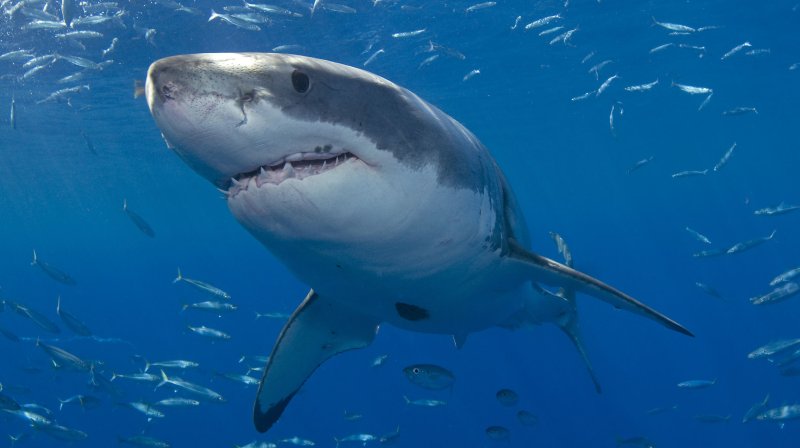1 of 7 | A Great White shark. (UPI Photo/Joe Marino) |
License Photo
Hello, Hamptons! Meet Mary Lee, the great white shark that's just hanging out offshore like a real-life Jaws.
But have no fear, Montauk. The good people of OCEARCH, the nonprofit Global Shark Tracker, are keeping a good eye on her, and other great whites around the world.
According to the East Hampton Patch, Mary Lee was first picked up on Tuesday at 6:04 p.m., when she came within 20 nautical miles of Quogue. She then turned eastward, and was at one point Wednesday afternoon about 40 nautical miles off of Montauk point, but has since headed away from the coast.
OCEARCH first tagged Mary Lee in September in Cape Cod, and named her after founder Chris Fischer's mother.
"I was waiting and waiting for a special shark to name after her and this is truly the most historic and legendary fish I have ever been a part of and it set the tone for Cape Cod," Fischer said, of Mary Lee, in her shark profile on the side.
Since she was first tagged, Mary Lee has spent the past few months traveling the eastern seaboard of the U.S., getting as far south as Ponte Vedra near Jacksonville, Fla. She's a mature shark--measuring 16 feet in length and weighing in at nearly 3500 pounds.
She could be anywhere from 20 years old to 70, but there's no way to tell the age of a living shark--a dead shark's spinal cord has rings that can be counted, much in the same way the rings of a tree can give away its age.
OCEARCH gets a ping on one of their 35 tagged sharks each time her dorsal fin breaks the surface of the water. Mary Lee, Fischer said, is a particularly coastal fish, unlike most of the sharks who "swim out in the ocean and we don't hear from them much."
Great whites can be found in oceans the world over--anywhere with water temperatures between 54 and 75°F. Despite their reputation as "man eater," most great white attacks on humans appear to be accidental or cases of mistaken identity, where the shark mistakes a swimmer, surfer or a small boat for tastier prey--and almost always non-fatal.
A Montauk shark may have touched off the fear of great whites that comes from Jaws, but Fischer hopes learning more about the sharks and their still mysterious habits will help debunk some of the worst of the myths.
"We hope people become more enlightened and a conversation is started, especially since we opened up this tracker for the world to see," he said. "When we think of a great white, we usually think of 'Jaws' music, but now people are asking what is she doing? Where is she going?"










